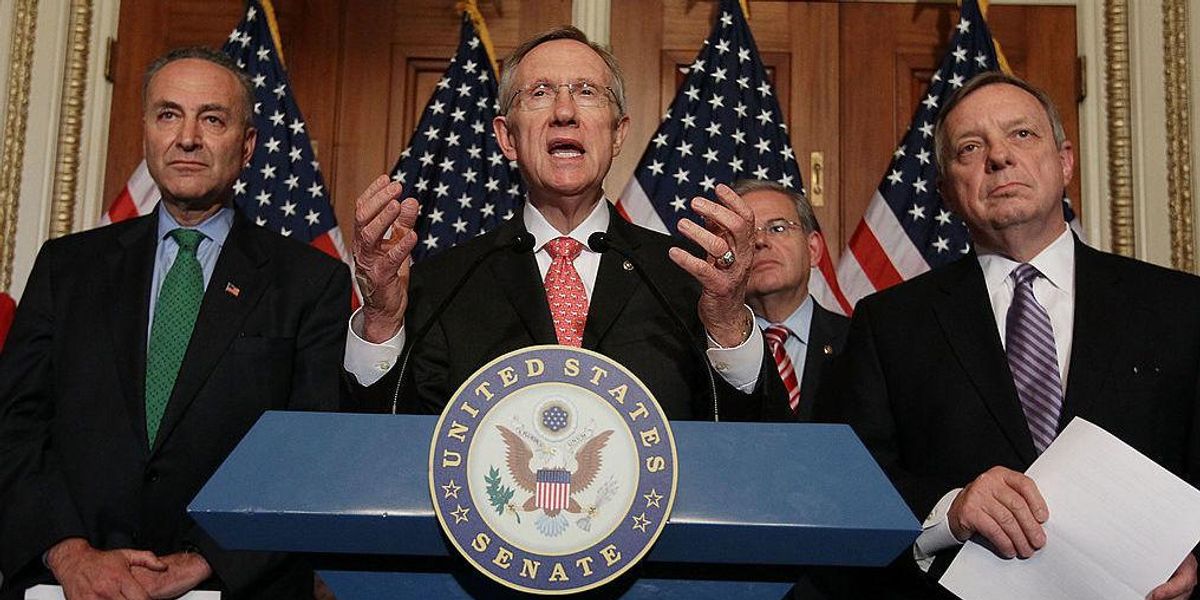Democrats are rebuking Republican lawmakers who plan to oppose the Electoral College certification of Joe Biden’s election victory on Jan. 6 over concerns that election fraud tainted the outcome of the presidential contest.
But, as it turns out, Democrats, including some of those launching broadsides against their GOP colleagues, have a history of opposing the Electoral College vote certification.
What are Democrats saying?
After Sen. Josh Hawley (R-Mo.) announced this week that he will oppose the certification of the Electoral College results during next week’s joint-session of Congress, Democrats blasted him.
Sen. Dick Durbin (D-Ill.) said, “The political equivalent of barking at the moon. This won’t be taken seriously, nor should it be. The American people made a decision on November 3rd and that decision must and will be honored and protected by the U.S. Senate and House of Representatives.”
Sen. Chris Van Hollen (D-Md.) said, “Sen. Hawley’s actions are grossly irresponsible. He’s attempting to undermine our democratic process, fuel Trump’s lies about voter fraud, and delay the certification of Biden’s win. In the end, this reckless stunt will fail, and Joe Biden will become President on Jan. 20, 2021.”
What did Democrats do before?
According to Fox News, Democrats have launched objections to Electoral College votes in the last three elections won by Republican presidents: George W. Bush’s 2000 and 2004 victories and President Donald Trump’s 2016 victory.
More from Fox News:
In early 2005 specifically, Sen. Barbara Boxer (D-Calif.) along with Rep. Stephanie Tubbs (D-Ohio) objected to Bush’s 2004 electoral votes in Ohio. That forced the chambers to leave their joint session and debate separately for two hours on whether to reject Ohio’s electoral votes. Neither did.
At the time, Democratic senators, like Hillary Clinton, Ted Kennedy, and Harry Reid, praised then-Sen. Barbara Boxer (D-Calif.) for raising objections. Durbin and Van Hollen were also among those celebrating Boxer.
Durbin said on the Senate floor at the time:
Some may criticize our colleague from California for bringing us here
for this brief debate. I thank her for doing that because it gives
Members an opportunity once again on a bipartisan basis to look at a
challenge that we face not just in the last election in one State but
in many States. Because of different electoral practices in States
across America, voters who wish to cast a vote for President or Vice
President cannot approach the polls with certainty that their vote will
be counted or that they can vote in a fair and convenient manner.
There are litanies of examples that could be cited. I do not
challenge the legitimacy of the 2004 election outcome. I do not believe
there is evidence of widespread fraud. I believe Senator Kerry was
correct in announcing his concession, but let us concede on a
bipartisan basis that we can and should do better.
Meanwhile, Van Hollen said in a press release in 2005:
I believe that Senator Barbara Boxer (D-CA) and Representative Stephanie Tubbs Jones (D-OH) have performed a very valuable public service in bringing this debate before the Congress. As Americans, we should all be troubled by reports of voting problems in many parts of the country. I have been particularly concerned about the lack of a verifiable paper record in connection with electronic voting systems. I am proud to be a co-sponsor of legislation to solve that problem.
In the end, Boxer was the only senator who voted against certifying Ohio’s electoral votes, while a whopping 31 Democrats in the House voted against certifying 2004 Ohio’s electoral votes.
At the time, the mainstream media also promoted stories about Ohio being “stolen” or that voting machine “glitches” marred election integrity.
Meanwhile, some House Democrats objected to the certification of Trump’s Electoral College victory in 2017 over allegations of Trump-Russia collusion.
“I object because people are horrified by the overwhelming evidence of Russian interference in our election,” Rep. Barbara Lee (D-Calif.) said at the time.
Specifically, objections were raised about the electoral votes belonging to Alabama, Florida, Michigan, Texas, Mississippi, North Carolina, and South Carolina, Reuters reported.
Anything else?
Indeed, Sen. Ted Cruz (R-Texas), who announced Saturday that he and 10 other Republican senators will oppose the certification vote on Jan. 6, explained that Democrats have established the precedent for such action.
“[T]here is long precedent of Democratic Members of Congress raising objections to presidential election results, as they did in 1969, 2001, 2005, and 2017. And, in both 1969 and 2005, a Democratic Senator joined with a Democratic House Member in forcing votes in both houses on whether to accept the presidential electors being challenged,” Cruz’s statement explained.
“The most direct precedent on this question arose in 1877, following serious allegations of fraud and illegal conduct in the Hayes-Tilden presidential race. Specifically, the elections in three states-Florida, Louisiana, and South Carolina-were alleged to have been conducted illegally,” the statement continued.
“In 1877, Congress did not ignore those allegations, nor did the media simply dismiss those raising them as radicals trying to undermine democracy. Instead, Congress appointed an Electoral Commission-consisting of five Senators, five House Members, and five Supreme Court Justices-to consider and resolve the disputed returns,” the statement explained.
